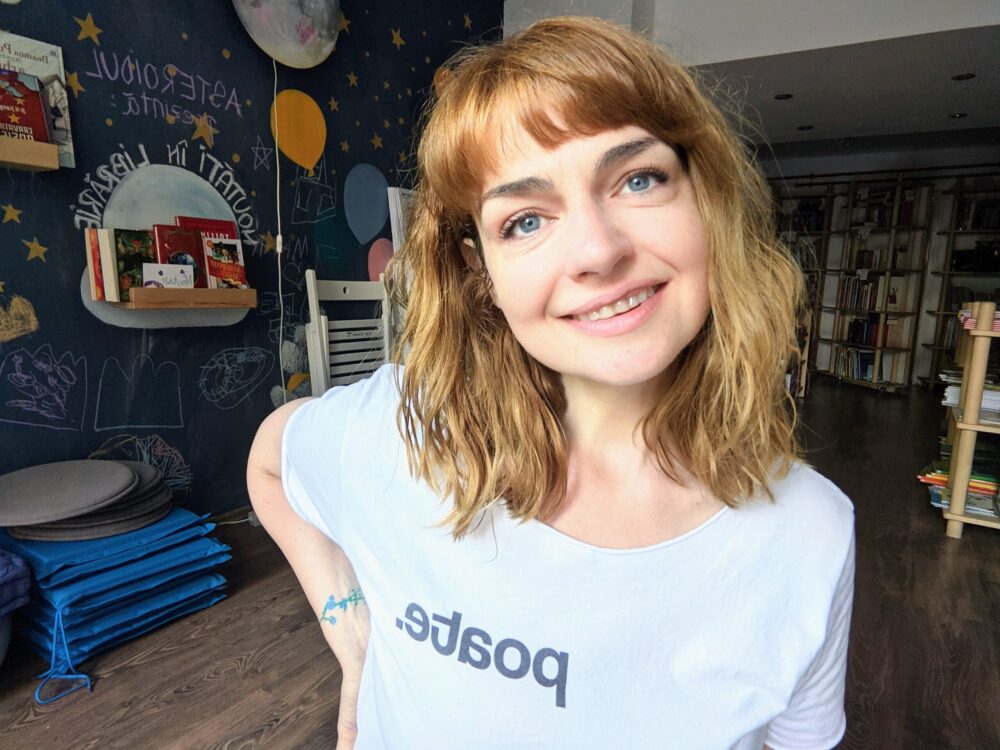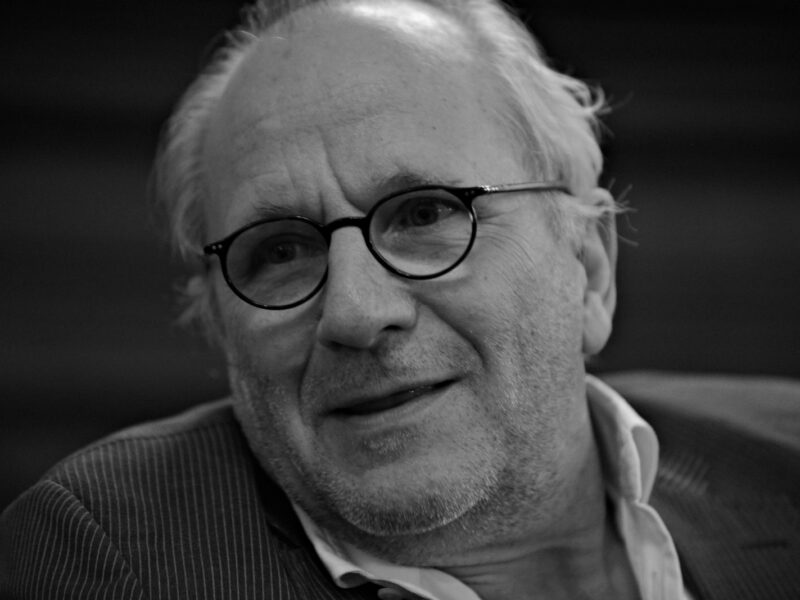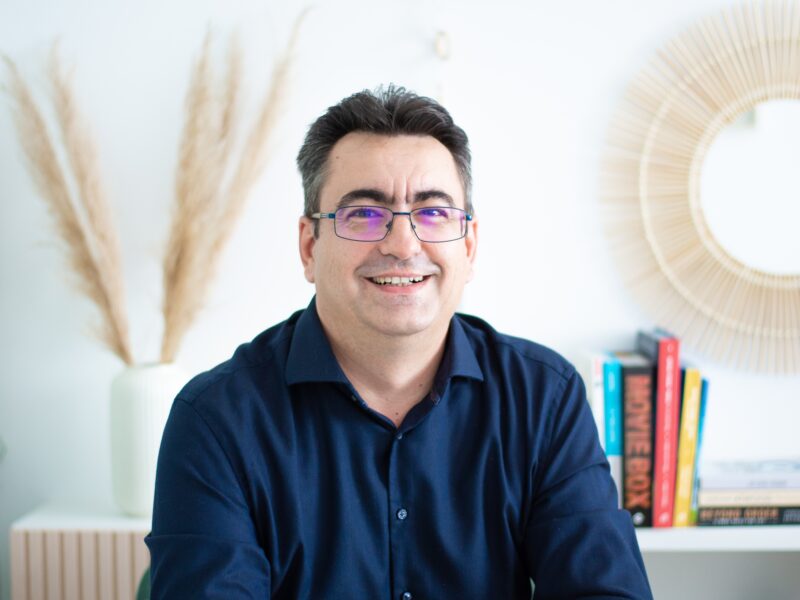Ana Sipciu opened the B612 Asteroid bookstore in 2019, not long before Christmas. In Cotroceni, on the Doctor Carol Davila street, the Asteroid hosts some of the most beautiful books for children translated in Romanian, but also Claire, the protector unicorn. After being and Industry Manager at Google, Ana decided to turn one of her old passions into a job and daily activity. And books get along really well with enthusiasm and optimism. For the only one more optimistic and cheerful than Ana is the coloring wall from the bookstore, after a Saturday full of kids. I talked to Ana about values, community and bestsellers on a morning, over a coffee, and the magician waiter that showed us a couple of tricks only confirmed that unicorns and books are the most real magical things.
What does a day of the life of the B612 Asteroid look like?
A Saturday, for example, begins when we place our “indicator” outside, at the corner – the bookstore entrance is right after the street corner and that’s why we’re often compared with The Shop Around the Corner from You’ve Got Mail You’ve Got Mail (my favourite reply to this is that in that case I can’t wait for Amazon to open across the street and to get married with the CEO). At 11 o’clock it’s the Storytime, namely the reading hour for children, which we’ve started since we opened the bookstore, in December 2019, and we haven’t stopped even during the pandemic (we just moved it online for a while). In the busy weekends, the first half of the day is an overall chaos, with cushions spread across the steps, books out of the shelves and browsed only to the half, this is how it is when you have curious readers. But it’s a very nice vibe . At noon there’s usually empty, because that’s the sleeping time of our target (we have books for children up to twelve years old). The “good” Saturdays are the ones which resemble an open house – like you’d be at home and all day long you’d be visited by old and new friends. We read, we draw on the wall, everything is very relaxing.
It’s different during the week. There are days when we start our schedule at noon, at 2 p.m., and we deal a lot with the administrative stuff. We try to work like a corporation in miniature, with procedures and work systems, because efficiency is very important in any business, and if we don’t have a certain level of exactness, we can’t grow. We’ve launched our sitesite recently and we take care of orders daily, because our goal is that every order placed by 12 a.m. to be shipped on the same day. It’s not easy, because we’re a small team, but we’re aware of the expectations of our customers in e-commerce and we’re doing our best to meet them. (Besides, we like to set high standards:). )
How comes you chose that place in Cotroceni? At first sight it doesn’t seem too well positioned from a commercial point of view.
It’s not . It was… serendipity, I guess. I discovered the place looking randomly on OLX, without any clear intentions in mind (at that moment I had just quit my former job from half a year, but I was still paralyzed by fear of the next step). It seemed really cute in pictures, small, pretty and most of all with a rent that didn’t freak me out that much – I came, I saw it, and I thought it emanated a very warm and welcoming vibe and I got along from the start really well with the owners. So I gave myself a push ahead and I signed the contract for this underground floor in the Botanical Garden area (it’s not situated in the cool area of Cotroceni, as I have been told). On the one hand the positioning doesn’t help us, because lots of people have to cross the city to get to us. On the other hand, if we hadn’t been lucky with the reasonable owners and the small rent, we would’ve certainly closed in 2020. And there’s another (sort of) advantage: only 10% of our visitors have seen the sign and entered so far. The rest of them found us online first and we had some kind of emotional connection. And I think that helped us developing a fantastic community, which I simply adore.
How (and if) have your contacts and open doors from your previous professional experiences helped you?
It has been very useful for me the fact that, having many jobs before, I have a personal network (established through professional means) to which many parents belong. All my friends have been very supportive, they spread the news, some of them became members of the community and brought other parents too. The industry change has been a very interesting experience for me. At my former job I was at a senior level; but with the publishing houses I returned to a situation where I was really a nobody and I had to start building relations from scratch and without a known brand to support me. It’s been a challenge, but I still like it. I think there are few things more beneficial to your brain than starting to learn something from scratch. It’s really cozy, when you get to an advanced level, to continue going on the same walked path, but when you have to do something from zero, the circumvolutions really do develop . It’s fantastic to learn something new every day.
What about the professional skills that you gained previously?
Those skills helped me enormously! Not necessarily the advertising and marketing competences – at least not the paid media ones (the industry I previously worked in), because we haven’t invested yet at all in advertising. I felt that my experience in the organizational culture and ideas and brand structure helped. In November 2019, when I was decorating the place, I sat in the middle of the site to mentally clarify what I was going to do here and I wrote a document with values and behaviours that to this day I still get back to, to check that we’re still on the right track. It’s a thing that everybody should do, but I think many of the people that start small businesses don’t make it from the beginning, because it doesn’t seem a priority. But it is – it helps you in taking decisions in your daily activity, and the small decisions are the “cells” of this organism. They’re essential.
At Asteroid, the 3 fundamental values are community/trust, joy and ethics. It sounds very pompous, but every value must be translated into behaviours. A simple example: what does ethics means? Among others, it implies that we always behave right – and that means that whatever happens, we pay our suppliers in time. What does trust mean? Among others, to start from the premise that every person that enters our door has good intentions. For example, it happened that a man wanted to buy some books, but his card didn’t work and he didn’t have cash with him. Then, because we invested that man with good faith and trust, we gave him the books and the receipt, which he paid online when he got home. I admit we’ve only been put in that position once, but it’s an example of a decision took based on values. It’s true that it wasn’t a big risk – at the dimension and community we have now, the chances for somebody to come and take out books without paying them are extremely low. Besides, we lose much less – We would’ve lost a few books, comparative with how much we earned in trust/relation from the man that goes through this experience. But you have to know who you are as a brand and structure certain behaviours that turn into organizational culture. And if you have a healthy culture from the beginning, you can grow healthy too. At least that’s my opinion.
How did you initiate the collaborations with the publishing houses? Did you go to them, did they come to you?
Saga: the relations with the publishing houses! Yes, it’s been interesting, I started by sending emails. It was exciting sometimes, because, at first, when I was sending emails I was nobody. Some publishing houses ignored me completely, some responded after a couple of messages, some responded pretty quick, but it’s been a very transactional relation – the kind that I wasn’t accustomed with. I think that every business relation must be mutually thriving, namely everybody to have something to gain, just like in a relationship. There were times when I wouldn’t receive a response to my repetitive emails or go to meet someone and find out that they had took their day off. I didn’t take it personally, I understood that I’m talking to sale people that are very busy and have certain goals – and a small bookstore that barely has a Facebookpage can’t impress too much. In the meantime things have changed and the publishing houses started to contact us directly or propose special projects to us.
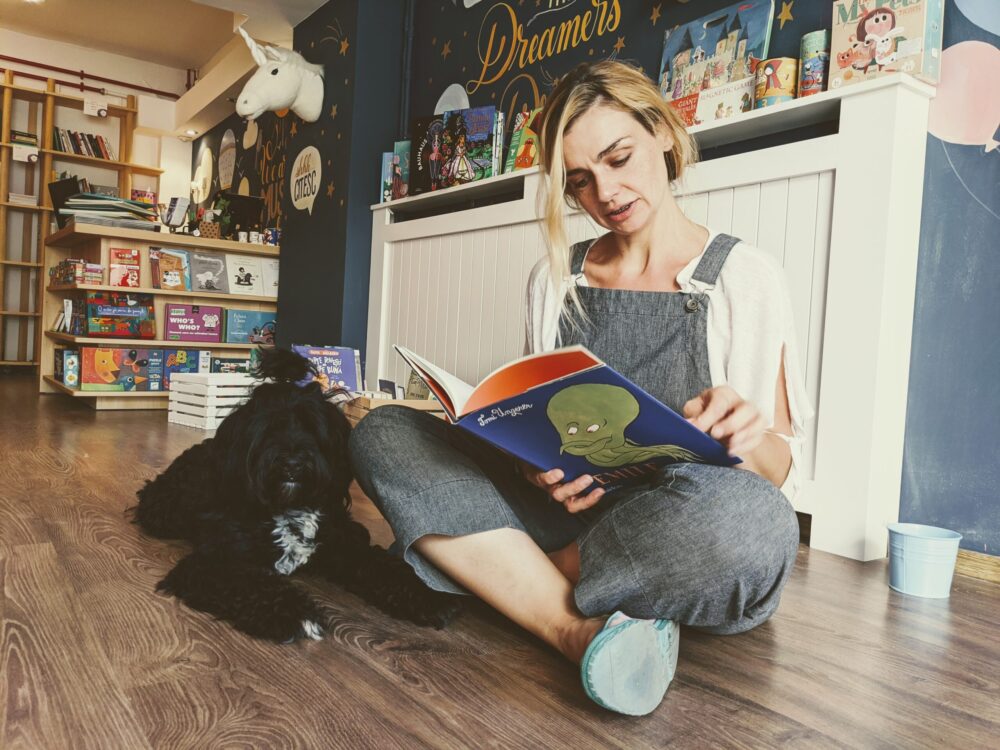
How do you select the titles you put on sale?
I don’t have kids and when I started with the bookstore I was clueless regarding the books for the little ones. The arrangement and opening took place in a very alert rhythm, because once we found the space I set my mind on opening the weekend before Christmas. Before the opening there was sort of a lift when, overwhelmed by the situation and with lots of empty shelves to fill, I ordered all kinds of stuff. Honestly, on the opening day we had on shelves a lot of titles… not so intelligently bought, because I didn’t know what I was throwing myself into. We keep them in a box in the deposit now and we’ll probably recycle them, because they wouldn’t make even good donations, from my point of view. After that I learnt – mostly from the direct experience I had in the bookstore and from the parents in the community – how to choose a book for children. You have to consider how it looks as an object (including how resistant it is when maneuvered with), the quality of the illustration (the child doesn’t read the letters, the graphic is his or her first interaction with the story), the complexity and fluidity of the text (you want a text that can be understood, but without offending the intelligence of the child), font and spacing (especially for early readers) and the conveyed message. For little kids it’s sometimes important to know the language particularities of the text (there are more aggressive words that certain parents tolerate in stories) or potential shocking elements from the story (if a character dies, for example). Parents need to know what are exposing their children to when buying a book and make an informed choice.
We’re following the novelties on the market and go through all the illustrated books for little ones, which and adult can read in 10 minutes. We don’t have time to read an entire book for older kids, but at least we “scan” them and we read the reviews from diverse readers. We receive openly recommendations from our visitors and community. And when we’re not sure of a new title we order a small amount and if we don’t like it we return them. When I say “we like” I’m referring to titles what we’d recommend anytime, confidently, no matter of the personal reading preferences. My objective is that the person could enter the bookstore with the eyes closed, grab a book and be sure that they made a good choice. The selection is in top three most important activities for us.
You collaborate with big editorial groups also, and with younger and older publishing houses. Does the way you work with them differ in any way? In that regard I liked the campaign you made with Katartis for their fruit book.
Yes, we collaborate with various publishing houses and the relation works more or less the same from the point of view of book selection. We have a special case with Katartis, because we have a very good personal chemistry with their team – the same as us, they’re a young, dynamic and very open-to-new team. We collaborate well with the ones that let us do whatever is going through our head, and we have that kind of relation with Katartis. For example, when we had the launch for Who’s the best, they came with the idea of having a nutritionist to have conversations with. We made the technical set up, we broadcasted live on Instagram, IGTV, we had a direct dialogue with the community and the event turned out great. The first project we did together was the online launch of the Pacoseries, in lockdown – which practically took place at my house, where I had a corner from which I broadcasted Storytime online on Facebook.
Another two publishing houses we have great partnerships with are Cartea Copiilor and Frontiera, who supported us right from the beginning.
In the Got Books? podcast you were saying that the transit from the marvelous procedures made on point by Google to everybody-does-whatever-they-want of the book market was one of the most difficult obstacles. Who were you referring to and what are the most stressful experiences of this kind?
I don’t think the problem is that publishing houses don’t have the Google procedure as much as every publishing house has its own way of orders – excel, mail text, it happened to me to make an order on Facebook too (after running out of the other communication channels). There’s no standard procedure regarding the communication of new titles to book stores – some send, others don’t, or maybe we’re not on the right lists. The most unpleasant thing is to find out about new releases after their launch, from the Facebook page of the publishing house.
Which title is your bestseller? How does a title qualify as a bestseller in a book store?
The bestseller-bestseller is Santa Claus by Mauri Kunnas, from the Cartea Copiilor. In the winter of 2020 we had a nice campaign, I would say – the Mail Box of Santa Claus. We had a real, adorable and red mail box on which it was written The North Pole Postal Office and we invited the kids to write letters to Santa Claus. Hundreds of children came to put their letters there, they made their Christmas shopping, of course, and that’s how this book by Mauri Kunnas was sold. It’s a splendor, we’ve recommended it to every person that entered out book store since then. And after that I replied too all the letters, I wrote by hand all the replies (as Santa Claus’s secretary, of course!)
On the 2nd place is Paco.
You used to say that the Asteroid is a "neighborhood bookstore." How do you manage to make your "neighbors" become buyers?
I didn't make a lot of effort, they just come – it's pretty easy to come for a walk with the little ones, especially in the afternoon. There is also our remarkable neighbor, Julie, who is twelve years old, wants to be an entrepreneur and comes to help us when she has time, after school. From Julie came the inspiration for "Growing Booksellers", a summer internship for children between 9 and 12 years.
Do you remember your first customers?
The first customers of that opening weekend were, for the most part, friends of mine who had seen the event on Facebook. I still hadn't managed to get the cash register to work, and somehow I didn't expect people to want to buy books. I thought they wanted to come and see the bookstore, but even to buy?! So everyone who came left with the books without paying for them and I later sent them invoices for bank transfers.
You have decided to bring only books for children up to 12 years old in the bookstore. Isn't this limitation a shortcoming in terms of the business itself? What is the reason behind it?
First of all, the space - we don't even have room for all the books up to twelve years that we would like to exhibit. Then, for me it is important to become an "authority" in our area of activity, I want to know very well the segment we work on. We chose a niche and we aim to be as good as possible. You can't be the best at anything, so 90% of our efforts go to children's literature up to the age of 12, with a slightly lower focus on non-fiction (for now - we certainly want more in this direction). And without activity books, coloring, etc. But we also have a shelf for adults, where there are books selected according to personal preferences. And we also have a subscription system - including one for parents, which is an extension pack and is only available with the children's subscription.
And how you manage to calibrate your type of communication and attract new customers. Focusing on this age group, I think you have to speak the language of the children, but also of the parents who, maybe many times, are the ones who bring them to the bookstore.
I think it's natural. First of all, children are the most important. We believe
that the moment a family enters the store, the child enters accompanied by parents and not the other way around. And we do this by paying attention to the child: you greet him or her individually, after you greet his or her parents, you physically go down to his level, you say “Hello!”, you speak directly to him or her, you treat them with respect. All children should be treated with the same respect as adults. If you want to show someone a book, show it to the child first.
It is important to give the parent time to breathe, because especially the youngest children must be kept busy; that's why we have the drawing wall, that's why we are always ready to read stories, to give the mother or the father time to look at books, to have a little peace of mind.
That's what happens in the bookstore. Online communication, on the other hand, is for parents.
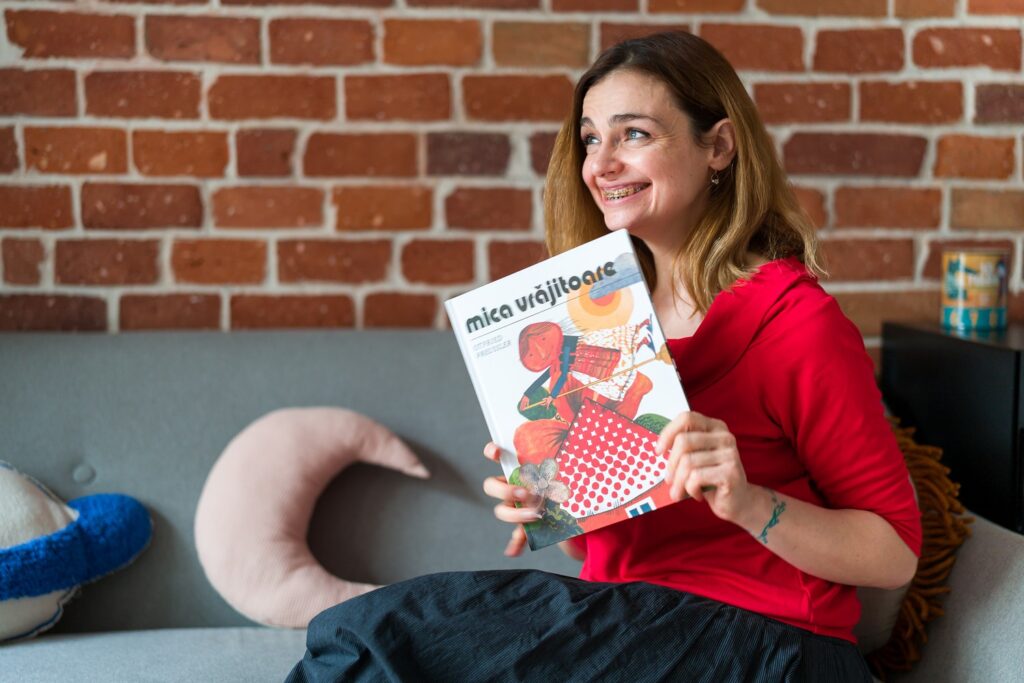
Asteroid is among the most active and involved bookstores in the online community. Because we are talking, again, about a business after all, how fast and how efficient is the conversion of views on Facebook into books bought from the bookstore?
Honestly, I didn't follow it. I know we should look at this indicator, and now that we've launched the site, we're going to pay more attention to the online conversion area. It works something by the "feeling” – people come and ask us exactly about the books they saw in the newsletter of the week. Although I can't calculate the exact impact of the various types of online activities.
You work with two other colleagues, Mădălina and Maria. Although the actual space of the bookstore is small, I suspect that the back mechanisms are like of any bookstore, so the effort is just as high. How do you manage to deal just the three of you with bureaucracies, logistics, finance and all this maybe not so sparkling stuff?
I often speak at plural because that's how I'm used to, if you have a business you can't say "I did this and that". Basically, I am the only founder, Mădă and Maria are the team we have. We do not share these matters ideally, because we all work part-time. But things also settled on their own - almost the entire selection part moved at Mădă, Maria was very involved in the development of the website. I have been very lucky since I started this adventure. For example, when Mădălina joined the team, I didn't know her. I posted then an ad on my personal Facebook profile, and a common acquaintance recommended her. It was a providential meeting because we complement each other very well in skills and abilities, and she has much more experience than me with children and stories. At the beginning of this year I gave a new announcement on the bookstore page and again there was a providential meeting with Maria. We wanted to hire another bookseller, but she has also some technical knowledge that turned out to be exactly what we needed for the site then. Now we’re trying to rethink the structure so that I’d be less operational, because otherwise we get nowhere. But we are still far from getting to the ideal solution.
Since there’s no school in Romania to teach you to be a book seller, how did you learn what and how, where did you "steal" your job from?
I learnt on the go and I’m continuing to learn. For me it seems to be an advantage the fact that I don't know how things go, because, once you already know how an industry traditionally works, you are very tempted to take the walked path. But if you don't know a thing, you try to find the best solution for yourself and often invent new things. I'm sure that's how we came to make so much video content that helped us. For example, we have developed a personalized video referral service; we have a form that people can fill out and we send them a video showing them the books. I started this in lockdown, because at that time I was receiving many requests for recommendations on social media, I didn't have a website yet and it took me a long time to answer them in writing. So I decided to send videos - it's much easier for me to open a book and talk about it in my room. Thus, the people can see it better and the way it looks like, and how big it is – they have more information at their disposal. In addition, it’s a more "humane" way of communication. I initially did it out of laziness, but later I noticed that, on average, the orders in video recommendations were two to three times higher than those in text recommendations. So we turned the video recommendations into a product that we offer - something that, as far as I know, no one else does. It also works because you can watch the video with the child, the choices are made together – it’s not an identical experience, but close to the visit to the bookstore. That's why I don't even try very hard to find out "how things are done" in the industry, I prefer to do them in a way that seems natural to us.
When does the bookstore get to make profit or cover its costs, or has it already got there?
No, it's not there yet. We have grown significantly compared to last year. One thing that helped us during the pandemic was that we were barely open and we didn't expect to make a profit so quickly. This year I hope to reach break-even. Last year we had a fairly small accounting loss, but we also had lower expenses with the employees and rent. I’m optimistic and confident that in time we’ll grow:).
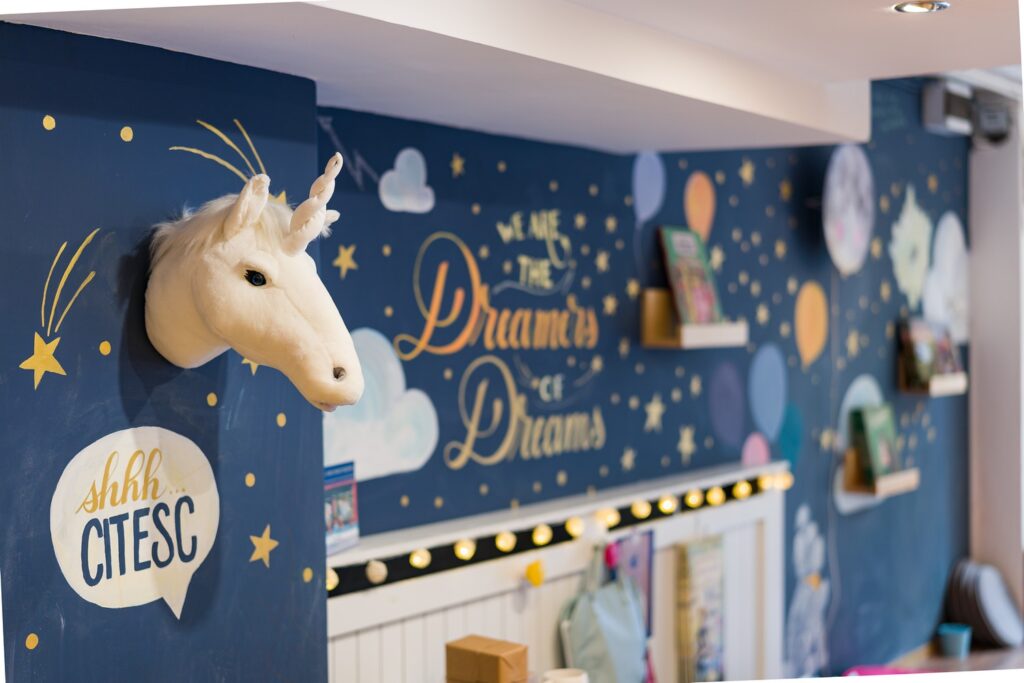
If Claire, the bookstore unicorn, the guardian of magic, as you called her, would take a few days off, in which children's book do you think she would travel? And what about you, what imaginary world would you go to?
I think she would go to a quiet and dark room, where she can't be reached by children pulling her horn and sticking their fingers in her nose:). Or maybe In the Grass, a Japanese sensory book about a child discovering nature, a quiet book that makes you feel like in a meadow; I think that's where Claire would go to have a zenith. I would go into an action novel! I like fantasy books, a bit unreal, like magical realism - maybe in 100 Years of Solitude, although that's why I’m going to therapy, so I don't live in such a world anymore. I also like Neil Gaiman, especially American Gods, but I don't think it would be too healthy of a space.
(Interview recorded audio and transcribed by Cosmina Mavrodin.) (Translated into English by Irina-Adelina Găinușă.)

